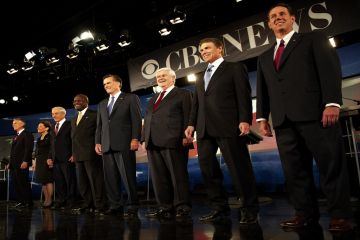Editor’s Note – For the first time, its seems the debate had only eight participants: Ron Paul, Bachman, Huntsman, Gingrich, Santorum, Romney, Perry, and Cain.
Why do we say only 8? Because the moderator was not one of them. In past debates, moderators seemed to be more like debate participants than umpires. As we all know, when the umpire is the subject of discussion for any reason after a game, that umpire did not do his job correctly. They should never be a part of the outcome, but that did not stop people like Maria Bartiromo or Brian Williams in past debates.
CNN’s Wolf Blitzer was perhaps the best so far. He did not challenge answers, bait internecine battles, cut-off speakers mid-answer, place words in participants mouths, or flat out inculcate a left leaning bias.
At one point Herman Cain got his name wrong, and Wolf called him Cain, but that was all in jest.
The banter was great, although at some point, someone has to challenge Obama and the Democrats over the so-called do-nothing Congress issue by pointing out that the Senate and Harry Reid have not produced a budget in any manner in over 1,000 days.
Here is a great summary of the debate by Victor Davis Hanson:
Getting Better
By Victor Davis Hanson, National Review
Although these debates are by now monotonous, they have the effect of shaping up the candidates (who are doing much better in general) and reminding us why the pre-primary race is really between Romney and Gingrich.
I guess Ron Paul did not consider the incineration of 3,000 Americans on American soil on 9/11 — something that neither Fascists or Communists ever achieved, and that by now would have been replicated without the Bush administration’s anti-terrorism protocols, as apparently the Obama administration believed (it embraced or expanded them all) and over 40 foiled plots attest — an act of war. Foreign relations reflect Paul’s weaknesses, but his isolationism is masked with folksy “let each country be itself” and ”taking money from poor here to give to rich abroad,” etc. All that sounds superficially sort of neat — if we forget that his cocoonism was American policy in the 1930s. It sometimes seems that the candidates are careful to dance around his views, given his possibility of a damaging third-party run.
Bachmann had her best debate, in a sincere sort of Fargo-earnestness and competence. She has no brain freezes, is detailed and animated, and comes across as earnest. If she had done this well earlier, she would be in contention, at least as much a House member can be.
Gingrich, the grand strategist, is in his top professorial, thinking-out-of-the-box mode that seeks to elevate the debate over the heads of other mere tacticians; whether it comes off as condescending or pontificating I’m not sure. Once again, though, he seems to be summarizing the Bush-Obama policy in Pakistan in a way that seems as though he is creating it. His advocacy for energy independence and his nuances on Iran are very good. With each question, we don’t expect an answer but an existential examination of the question itself; does that reflect deeper thinking than Romney’s short, competent answers, or a sort of serial pop philosophizing?
Perry is becoming the almost over-the-top candidate — last time eliminating cabinet departments and now cutting off all “blank checks” to Pakistan (to be replaced by “trade zones”?) and suggesting Leon Panetta resign. I guess he has to push the envelope, given that time is running out. He is getting better, but that is mostly because he was lately so weak.
Rick Santorum does great when he answers directly the question asked. The more he avoids attacking others, or curbs his exasperation that his often superior answers don’t lead to political traction, the better he does. But somehow such an experienced and knowledgeable candidate always seems frustrated to the point of vexation.
Cain seems never to offer any details in any of his answers, but instead offers standard business leadership talking points; I don’t think it works, since his template replies that he wants clarity, defined goals, etc. often come off as a way of avoiding providing any details about the Middle East. When he gets to illegal immigration, his greater detail on this topic reminds us that he cannot offer commensurate information on foreign policy per se.
Romney once again shows that he is sober and judicious on foreign policy in a way that some of the others come off a little scary. He does well counter-punching and avoids the crowd-pleasing gestures. His debate style is the way of his campaign, a sort of rope-a-dope, process-of-elimination candidacy. He gets neither the boos nor the cheers of the others, avoiding the Gingrich-type inspired, existential quips and the Perry-Cain weirdness. Each week that he survives, I think he gets stronger, rather than in need of a “breakout.”
Huntsman keeps harping on the Vietnam-era argument that troops abroad come at the expense of “nation building.” But he doesn’t seem to get the idea that 96 percent of our GDP is not going to defense or war in particular, but to massive social spending. His polish and unconservatism remind me a lot of the old 1960s Republican liberals like Charles Goodell, Mark Hatfield, and John Lindsay who so enthralled Democrats.
All in all, the candidates are all doing much better, and the debate reflects both that fact and that most of all of them would be far better prepared abroad than the president.

